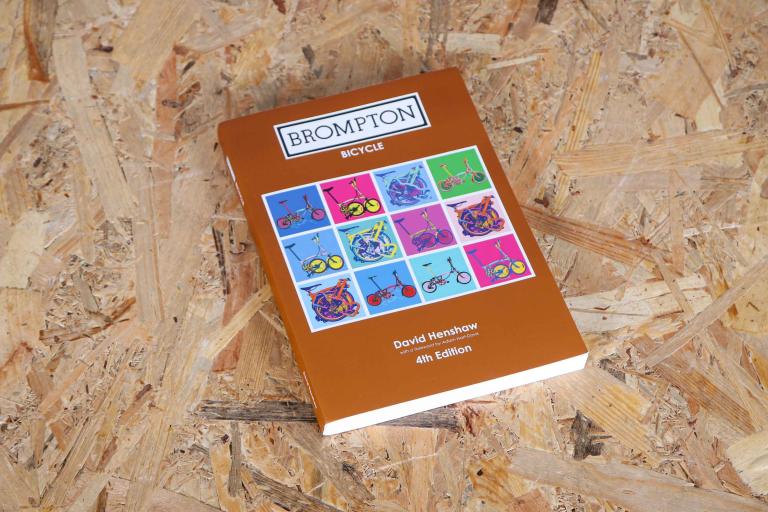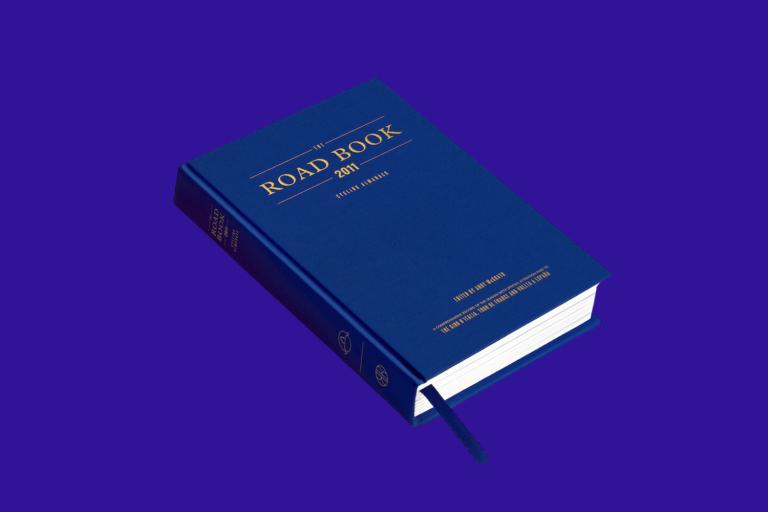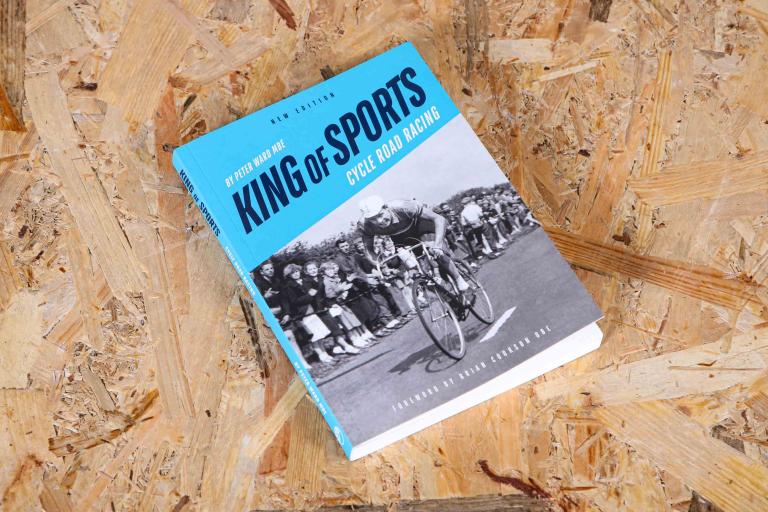- News
- Reviews
- Bikes
- Components
- Bar tape & grips
- Bottom brackets
- Brake & gear cables
- Brake & STI levers
- Brake pads & spares
- Brakes
- Cassettes & freewheels
- Chains
- Chainsets & chainrings
- Derailleurs - front
- Derailleurs - rear
- Forks
- Gear levers & shifters
- Groupsets
- Handlebars & extensions
- Headsets
- Hubs
- Inner tubes
- Pedals
- Quick releases & skewers
- Saddles
- Seatposts
- Stems
- Wheels
- Tyres
- Tubeless valves
- Accessories
- Accessories - misc
- Computer mounts
- Bags
- Bar ends
- Bike bags & cases
- Bottle cages
- Bottles
- Cameras
- Car racks
- Child seats
- Computers
- Glasses
- GPS units
- Helmets
- Lights - front
- Lights - rear
- Lights - sets
- Locks
- Mirrors
- Mudguards
- Racks
- Pumps & CO2 inflators
- Puncture kits
- Reflectives
- Smart watches
- Stands and racks
- Trailers
- Clothing
- Health, fitness and nutrition
- Tools and workshop
- Miscellaneous
- Buyers Guides
- Features
- Forum
- Recommends
- Podcast
review
 Fuelling-the-Cycling-Revolution.png
Fuelling-the-Cycling-Revolution.png£16.99
VERDICT:
An excellent one-stop source of information and advice for improving your cycling performance by choosing the right food and drink
Weight:
625g
Contact:
At road.cc every product is thoroughly tested for as long as it takes to get a proper insight into how well it works. Our reviewers are experienced cyclists that we trust to be objective. While we strive to ensure that opinions expressed are backed up by facts, reviews are by their nature an informed opinion, not a definitive verdict. We don't intentionally try to break anything (except locks) but we do try to look for weak points in any design. The overall score is not just an average of the other scores: it reflects both a product's function and value – with value determined by how a product compares with items of similar spec, quality, and price.
What the road.cc scores meanGood scores are more common than bad, because fortunately good products are more common than bad.
- Exceptional
- Excellent
- Very Good
- Good
- Quite good
- Average
- Not so good
- Poor
- Bad
- Appalling
It can be difficult to make the right decisions about your diet if you are an athlete: there will rarely be absolute certainty that something works or not, so anyone seeking to optimise their sports nutrition risks being seduced by the latest wacky theory or faddy food. In my more competitive days I searched in vain for a comprehensive source of proven, practical advice that I could believe in and understand – and I have belatedly found it in Fuelling the Cycling Revolution.
Some may recognise Nigel Mitchell's name from his time as a dietitian with British Cycling, Team Sky, or Cannondale-Drapac. He has also worked with nutrition companies CNP and OTE, and has been involved in sports as diverse as football, swimming, boxing, and sailing.
Although the terms are sometimes used interchangeably, Mitchell likes to 'make a distinction between a dietician and a nutritionist. To be a dietician, you have to attain a recognised clinical qualification...Anyone can call themselves a nutritionist, regardless of qualification.' Mitchell is very much one of the former, and he continues to be involved in the world of academia and research.
The revolution that Mitchell refers to in the book's title is British cycling's (with a small c) success at the highest levels of the sport. Having been involved with British Cycling (with big a C) since 2002 and Team Sky since 2009, Mitchell was certainly involved during 'our' rise to the top. How much of this was down to better nutrition is hard to say, but it undoubtedly played a part.
One of Mitchell's high-profile success stories concerned the changes to Bradley Wiggins' body composition in preparation for different cycling disciplines. Of course that is a bit extreme for most of us, but it shows what is possible, and many of the same principles can be applied by regular cyclists.
Not surprisingly, Mitchell argues that 'nutrition may not be as exciting or instantly gratifying as a flash new set of deep-section wheels, but I can guarantee...it'll have a far greater impact on your cycling performance'.
Team Sky may or may not have been 'exploiting' the rules a bit in some areas, but I don't think anyone has accused them of doing so with nutrition. Obviously, the scope for improvement depends on your starting point, but my view is that if some basic rules are rigorously applied then nutrition can make a worthwhile difference to your performance, and if you approach the book with that attitude you won't be disappointed.
The sub-title on the cover actually does this book a disservice: The nutritional strategies and recipes behind Grand Tour wins and Olympic gold medals. It is true, but it might make you think that the book would not be relevant to your level of cycling, which is definitely not true.
The back cover is more reassuring, promising an 'accessible and practical toolkit': every chapter gives the science behind each topic, and while it is necessarily technical at times, I did not find it 'indigestible'. However, just in case you can't 'stomach' all the science, there is a summary of 'knowledge to take away' at the end of each chapter, which gives you the key points to act on in simple terms.
> Buyer's Guide: 23 of the best books for all cyclists
One of the changes that Mitchell introduced at Team Sky was to stop the supply of post-stage fizzy drinks 'because it undermined the recovery process', and introduce a protein-based recovery drink instead. Most teams seem to do something similar these days, and it would be a simple change for any cyclist to make.
Mitchell has clear views on good hydration practice, and dislikes the 'sponsored research that has encouraged people to drink sugar-laden sports drinks when it simply isn't necessary'. Despite his commercial connections, he does not promote any specific brands, and even supports the idea of avoiding ready-made products altogether by providing recipes for his own homemade products, such as a sports drink. Containing a mere three ingredients, the instructions could not be simpler: 'Put all of the ingredients into a drinks bottle and give it a shake.'
While this is not a fully-fledged recipe book, unlike this one, there are a few other recipes for on and off the bike nutrition – including Mitchell's famous rice cakes, where the easy-access foil wrapping is nearly as important to their success as the contents.
I would argue with his Perfect Porridge though; I can understand why he wants athlete's porridge to be made with water, but to be 'perfect' it surely requires full-fat milk.
Continuing with the aim of offering practical advice, Mitchells addresses many of the questions that we might encounter in normal life: how to follow a gluten-free or dairy-free diet, for example, and if they can offer benefits even if you are not intolerant; whether you should take multi-vitamin tablets; or how to manage your caffeine intake. These are the sort of questions you might be considering as you balance your cycling performance against your everyday diet.
The final chapter brings all Mitchell's thoughts together with a 'nutritional timeline' for various events: if you have a long ride with an early start, what should you do before, during, and after the event? (A bit like this.) Or how about for a 10-mile time trial in the evening? (Like this.) Or even the best things to do on an everyday commute? Many of us have learnt what to do through trial and error over the years, but it would have been much easier to have had access to simple plans like these.
Looking to the future, Mitchell is excited by the potential of Ketones as a supplement, which are 'an ergogenic supplement that could genuinely deliver a performance boost'. Don't expect them to become readily available anytime soon, though, and when they are, it will be interesting to see if their use by athletes is controlled.
Fuelling the Cycling Revolution really does live up to its claim to provide 'a no-nonsense and non-faddy approach to a subject that's often shrouded in mystery and pseudo-science'. No matter what level you are performing at, you are likely to benefit from attention to your nutrition, and this book gives you plenty of credible and practical guidance. I wish it had been available many years ago.
Verdict
An excellent one-stop source of information and advice for improving your cycling performance by choosing the right food and drink
road.cc test report
Make and model: Fuelling the Cycling Revolution, by Nigel Mitchell
Size tested: n/a
Tell us what the product is for
From Bloomsbury:
The must-read practical guide to what to eat (on and off the bike) for any cyclist looking for a training or performance advantage
If you're looking for success on the bike what you eat is at the core of all your training. You are what you eat - and if you're on the bike for long periods and expecting results then your diet is crucial. Get it wrong and you can feel sluggish and below par – but eat right and all the training and preparation will be worth it.
Nigel Mitchell, head of nutrition at Cannondale–Drapac, is at the pinnacle of delivering cutting edge nutrition, and has demonstrated this at the elite level of cycling.
Now Nigel lifts the lid on his nutritional secrets and the knowledge and experience gained from working with the top professional to help you get the most from your diet to fuel your cycling and gain a performance advantage.
This accessible and practical toolkit features crucial rules to follow and 24 nutritional recipes for breakfast, main meals and snacks. This is a no-nonsense and non-faddy approach to a subject that's often shrouded in mystery and pseudo-science. Pro rider anecdotes and race case studies feature throughout to help you identify your own requirements.
Tell us some more about the technical aspects of the product?
Title: Fuelling the cycling revolution
Author: Nigel Mitchell
Publisher: Bloomsbury
Date: 15/6/17
Format: Paperback
Pages: 240
ISBN: 9781472936936
Price: £16.99
Rate the product for performance:
9/10
Rate the product for value:
7/10
The book is currently available for under £10 direct from the publishers Bloomsbury, although there is postage to be paid on top of that.
Tell us how the product performed overall when used for its designed purpose
Excellent – it provides plenty of credible and practical guidance.
Tell us what you particularly liked about the product
Comprehensive, clear, and credible.
Tell us what you particularly disliked about the product
The pictures are nice enough, but many have little or no connection with the subject matter.
Did you enjoy using the product? Yes
Would you consider buying the product? Yes
Would you recommend the product to a friend? Yes
Use this box to explain your overall score
Delivers on its promise, and would benefit everyone.
About the tester
Age: 55
I usually ride: My best bike is:
I've been riding for: Over 20 years I ride: Every day I would class myself as: Expert
I regularly do the following types of riding: commuting, touring, club rides, sportives, general fitness riding
Latest Comments
- pockstone 11 min 9 sec ago
At the heart of great comedy lies truth.
- brooksby 13 min 12 sec ago
"I'm so sorry, I seem to have knocked that mirror. … I'm sorry, I seem to have done it again. And again."...
- Cugel 23 min 11 sec ago
The "more cycling infrastructure" lobby is fixated on their supposed "solution" to the dangers of bad driving, despite an overwhelming amount of...
- Car Delenda Est 1 hour 4 min ago
If it rests on intent then the lock is fine if it's on your own property, you can't really argue the cyclist was eagerly waiting for their bike to...
- brooksby 1 hour 23 min ago
I read that 'article' earlier on....
- David9694 2 hours 26 min ago
Notwithstanding its collapsing circulation, I still get it quoted to me as a source of news and information in my local Comments section. If I...
- hutchdaddy 2 hours 58 min ago
It's clearly a shit car, you won't get your cycle in the back of it and it won't have a CD player.
- essexian 4 hours 17 min ago
Before I had even said this persons home address, my wife said upon hearing the story: "He's from Loggerheads isn't he...."
- Rekrab 13 hours 19 min ago
MORE LANES, MORE LANES!!!!
- Simon E 13 hours 26 min ago
The numbers don't tell anything like the whole story....




Add new comment
5 comments
I'm about halfway through this.
There are some very interesting ideas in here. The idea of reducing the bulk in your gut in the leadup to an event particularly struck a chord with me. Instant 2kg weight loss
So far, I think it's been a worthwhile read.
You should correct it if you want to be considered a man of the peploe!
Good spot. Whilst both spellings are considered acceptable, I should have been consistent.
Interestingly dietitian is only spelt correctly at the start in the opening.
both spellings are correct.